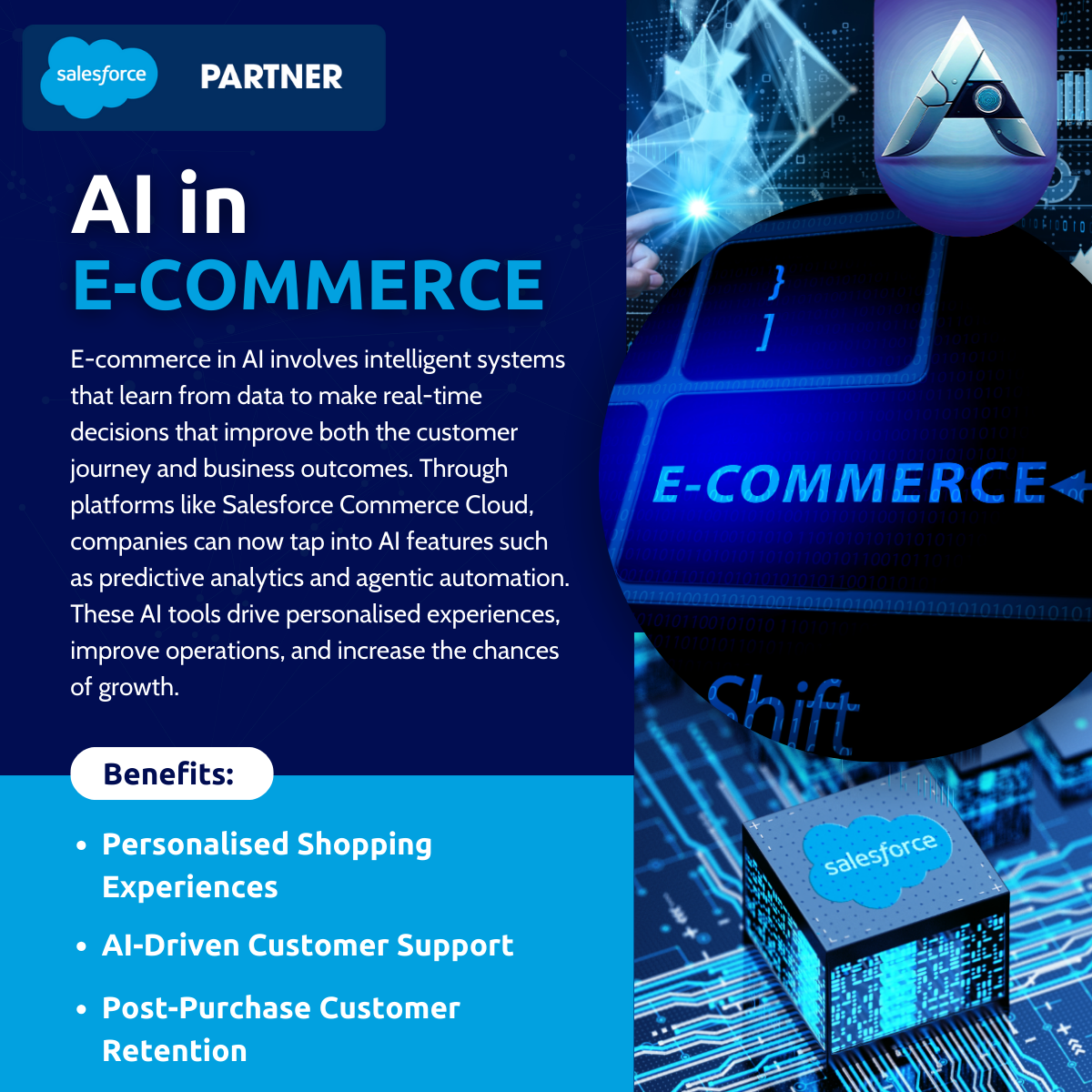
The integration of artificial intelligence into e-commerce is redefining the digital shopping experience. From dynamic personalisation to backend automation, AI technologies are enabling retailers to optimise every aspect of their operations. What was once an emerging trend is now a necessity of modern e-commerce, transforming how businesses interact with consumers, manage logistics, and scale efficiently.
E-commerce in AI involves intelligent systems that learn from data to make real-time decisions that improve both the customer journey and business outcomes. Through platforms like Salesforce Commerce Cloud, companies can now tap into AI features such as predictive analytics and agentic automation. These AI tools drive personalised experiences, improve operations, and increase the chances of growth.
Generative AI
One of the most impactful uses of AI in e-commerce is in content creation. Salesforce’s Einstein GPT enables businesses to auto-generate product descriptions, promotional blurbs, and SEO-rich metadata at scale. This is especially beneficial for retailers with extensive inventories, where manual content generation would be too time-consuming and inconsistent. Generative AI ensures each item is presented attractively and accurately, improving visibility in search engines and appealing to shoppers.
Moreover, using e-commerce in AI for content creation not only increases productivity but also enhances customer engagement. By tailoring descriptions based on consumer behaviour and preferences, AI-generated content becomes more relevant and persuasive. With continuous learning, these tools refine their outputs to reflect evolving trends and shopper feedback, ensuring content remains fresh and impactful.
Personalised Shopping Experiences
Personalisation is now expected by online shoppers, and AI has the ability to drive it in the most effective and efficient way. Salesforce’s AI capabilities sift through vast amounts of customer data, such as browsing history, past purchases, and real-time behaviours, to deliver curated product recommendations. This increases conversion rates by presenting customers with items that resonate with their interests and needs, reducing friction in the buying process.
By applying e-commerce in AI, businesses can craft individualised experiences that extend beyond product suggestions. From dynamic homepage layouts to personalised email campaigns, AI adapts the entire user journey to each customer. This deeper personalisation leads to stronger customer relationships and improved retention.
AI-Driven Customer Support
Modern customers demand instant support, and AI-powered virtual assistants meet this need effectively. Integrated into Salesforce Commerce Cloud, chatbots and virtual agents provide 24/7 support, assisting with common queries, order tracking, and product recommendations. These tools can resolve issues swiftly, improving customer satisfaction while reducing strain on human service teams.
Beyond basic assistance, e-commerce in AI empowers these bots to learn from interactions and personalise support. They can predict intent, recommend next steps, and escalate complex issues only when necessary. This ensures a seamless blend of automation and human empathy, optimising resource allocation without compromising on service quality.
Efficient Operations and Cost Reduction
Automation carried out by AI is reshaping backend operations in e-commerce. Salesforce’s AI tools handle inventory management, logistics planning, and order fulfilment with minimal oversight. This leads to fewer errors, reduced labour costs, and faster turnaround times. Retailers gain greater control over supply chains while minimising inefficiencies.
When applied holistically, e-commerce in AI becomes a lever for cost reduction and business growth. Automating repetitive tasks means employees can redirect their efforts toward value-adding initiatives. Additionally, predictive analytics help forecast demand more accurately, reducing overstock and understock issues that typically drain revenue.
Post-Purchase Customer Retention
Customer acquisition gets most of the attention, but AI’s role in post-purchase engagement is just as critical. Salesforce’s AI tools personalise follow-up messages, recommend complementary products, and offer tailored loyalty programmes. These actions keep customers engaged long after their initial purchase and encourage repeat business.
The use of e-commerce in AI in this phase helps brands stay relevant and top-of-mind. By analysing reorder cycles and purchase history, AI can predict when a customer might need a refill or upgrade, prompting timely and context-aware communication. This approach builds trust and fosters a deeper, ongoing relationship with the customer.
AI-Driven Sustainability Initiatives
Sustainability is a rising priority, and AI can be a powerful ally in achieving green goals. Salesforce’s AI capabilities optimise delivery routes, reduce packaging waste, and identify environmentally friendly suppliers. These measures contribute to a smaller carbon footprint without sacrificing service quality.
Furthermore, e-commerce in AI supports consumers in making eco-conscious choices. AI-driven interfaces can highlight sustainable product options or carbon-neutral shipping methods. Retailers leveraging AI for sustainability also enhance their brand image, appealing to a growing base of environmentally aware shoppers.
AI’s Role in B2B E-Commerce
While B2C applications dominate discussions, AI is equally transformative in B2B e-commerce. Salesforce’s AI tools streamline complex procurement processes, automate bulk order configurations, and manage dynamic pricing structures. These capabilities are essential for businesses dealing with large orders and custom contracts.
Incorporating e-commerce in AI into B2B workflows ensures better service and efficiency. Buyers receive personalised experiences similar to B2C but tailored for business needs. AI also aids in relationship management, identifying upsell opportunities and optimising communication strategies for long-term success.
Ethical Considerations and Data Privacy
AI’s growth raises ethical questions, especially around data privacy and algorithmic bias. Salesforce ensures its AI systems comply with global regulations such as GDPR, incorporating safeguards to protect consumer data. Transparency in data handling builds trust and mitigates legal risks for businesses.
Addressing ethics within e-commerce in AI means being proactive about fairness and accountability. Bias-free recommendation systems and opt-in data usage models are essential to responsible AI implementation. As e-commerce grows more intelligent, so too must its commitment to consumer rights and equity.
Case Studies: AI in Action
Case Study 1: Personalised Shopping at Scale
Online apparel retailers that have adopted Salesforce’s AI recommendation engine saw a 20% increase in average order value. By analysing shopper behaviour in real-time, the platform presented hyper-relevant product suggestions, transforming casual browsers into loyal buyers.
Case Study 2: Cost Reduction with Agentic AI
Electronics marketplaces that used Salesforce’s agentic AI to automate order fulfilment and return processing saw a 30% cut in overhead costs and a 15% improvement in delivery times, all while maintaining high customer satisfaction scores.
Salesforce Agentforce
Unlike traditional chatbots that react to user inputs, Salesforce’s ‘Agentforce’ uses agents that proactively manage tasks such as site optimisation, customer engagement, and inventory management. These agents operate continuously, analysing data and making real-time decisions to enhance the shopping experience and streamline backend processes.
The integration of Agentforce within Salesforce’s ecosystem exemplifies the transformative potential of e-commerce in AI. By leveraging Agentforce, businesses can automate complex workflows, personalise customer interactions, and adapt swiftly to market changes, all while maintaining high levels of efficiency and customer satisfaction. This not only reduces operational costs but also empowers teams to focus on strategic initiatives, driving innovation and growth in the competitive e-commerce landscape.
Conclusion
The future of retail is AI, and platforms like Salesforce are at the heart of this evolution, providing tools that make e-commerce smarter, faster, and more sustainable. Whether through content automation, customer engagement, or backend efficiency, AI is reshaping the digital shopping world.
With e-commerce in AI becoming the norm rather than the exception, businesses must adopt intelligent systems to remain competitive. From ethical data use to personalised experiences and sustainable operations, embracing AI today sets the foundation for tomorrow’s success in a rapidly evolving marketplace.




